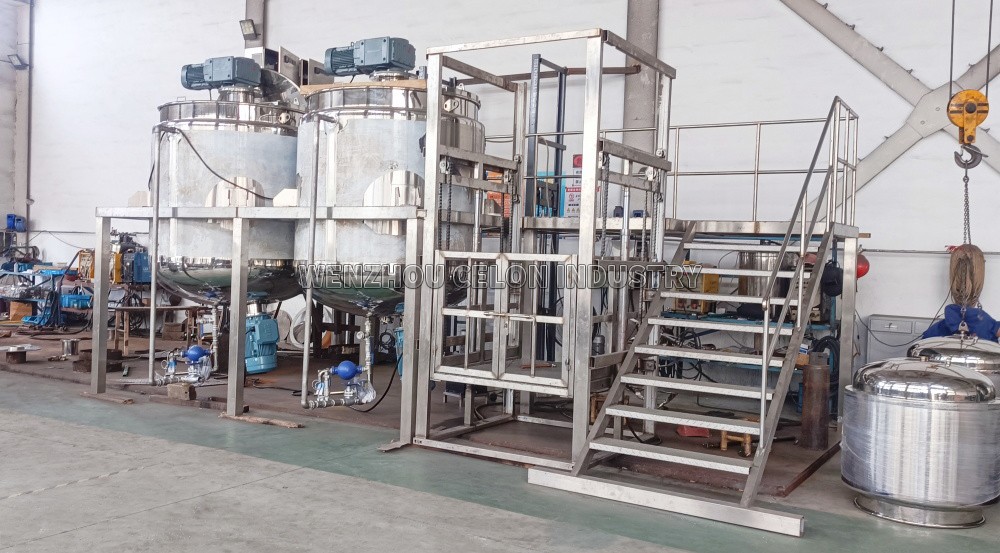How Shampoo is Made in Industry: A Comprehensive Guide
How is Shampoo Made in Industry?A Comprehensive Guide
Introduction: The Science Behind Your Daily Shampoo
Ever wondered what goes into creating the shampoo that leaves your hair clean, shiny, and refreshed? Behind every bottle is a fascinating blend of science, technology, and industrial precision. From high-performance mixing tanks to carefully selected raw materials, industrial shampoo production is a sophisticated process designed to deliver consistent quality on a massive scale. In this article, we'll take you through the equipment, ingredients, and steps involved in making shampoo, while showcasing how Celon's advanced mixing solutions empower manufacturers to create top-tier products. Whether you're a consumer curious about your favorite shampoo or a business looking to optimize production, this article offers valuable insights into an industry that touches millions of lives daily.
1. Equipment Needed for Industrial Shampoo Production

Industrial shampoo production requires specialized equipment to ensure consistency, quality, and efficiency. Key machines include:
Mixing Tanks: High-capacity stainless steel tanks with agitators for blending ingredients. Celon's mixing tanks are designed for precise temperature control and homogeneous mixing.
Emulsifying Tanks: Used for creating stable emulsions, critical for shampoos with oils or conditioning agents. These tanks feature high-shear mixers to reduce particle size.
Homogenizers: Ensure uniform texture by breaking down particles under high pressure.
Filling Machines: Automated systems for bottling shampoo efficiently.
Water Treatment Systems: Reverse osmosis systems to purify water, a primary ingredient in shampoos.
Pumps and Piping: Transfer liquids between tanks while maintaining hygiene.
These machines work together to streamline large-scale production, ensuring shampoos meet quality standards. Celon's equipment, for instance, is engineered for durability and compliance with GMP (Good Manufacturing Practice) standards.
2. Types of Shampoo Produced Industrially

Shampoos vary based on their purpose, target market, and formulation. Common types include:
Cleansing Shampoos: Focus on removing dirt, oil, and impurities. Contain higher levels of surfactants like sodium lauryl sulfate (SLS).
Moisturizing Shampoos: Include conditioning agents like silicones or natural oils for hydration.
Anti-Dandruff Shampoos: Formulated with active ingredients like zinc pyrithione or ketoconazole to combat scalp issues.
Color-Protecting Shampoos: Designed to preserve hair dye with mild surfactants and UV filters.
Natural/Organic Shampoos: Use plant-based ingredients, avoiding sulfates and parabens.
Baby Shampoos: Mild, tear-free formulas with gentle surfactants like cocamidopropyl betaine.
Each type requires specific formulations, influencing the choice of equipment and production techniques.
3. Raw Materials in Industrial Shampoo Production
Shampoo formulations consist of carefully selected ingredients, each serving a specific function:
Water (50-80%): The base ingredient, purified to remove impurities.
Surfactants (10-30%): Cleansing agents like sodium lauryl sulfate, sodium laureth sulfate, or milder options like cocamidopropyl betaine.
Conditioning Agents (1-5%): Silicones, polyquaternium, or natural oils (e.g., argan, coconut) for smoothness and shine.
Thickeners (1-3%): Salt, xanthan gum, or cellulose derivatives to achieve desired viscosity.
Active Ingredients: Zinc pyrithione for anti-dandruff, botanical extracts for natural shampoos, or proteins for strengthening.
Preservatives: Parabens or phenoxyethanol to extend shelf life.
Fragrances and Colorants: Enhance sensory appeal.
pH Adjusters: Citric acid or sodium hydroxide to balance pH for scalp compatibility.
Raw materials are sourced from certified suppliers and tested for quality to ensure safety and performance.
4. The Industrial Shampoo Production Process
The shampoo production process involves several stages, each requiring precision:
Water Purification: Water is treated using reverse osmosis to remove minerals and contaminants.
Pre-Mixing: Surfactants and water are blended in mixing tanks at controlled temperatures to create the base.
Addition of Active Ingredients: Conditioning agents, thickeners, and active ingredients are added gradually, often in emulsifying tanks for uniform dispersion.
Homogenization: The mixture is processed in a homogenizer to ensure a smooth, stable emulsion.
pH and Viscosity Adjustment: Technicians test and adjust pH and viscosity to meet specifications.
Quality Control: Samples are tested for stability, microbial content, and performance.
Filling and Packaging: The final product is transferred to filling machines, bottled, labeled, and packaged.
Storage and Distribution: Finished shampoos are stored in controlled environments before shipping.
This process demands robust equipment to handle high volumes while maintaining quality. Celon's mixing and emulsifying tanks are optimized for these tasks, reducing production time and waste.
5. Celon's Advanced Mixing Solutions for Shampoo Production
At Celon, we specialize in providing state-of-the-art mixing and emulsifying solutions tailored for shampoo manufacturing. Our equipment offers:
High-Performance Mixing Tanks: Equipped with variable-speed agitators and heating/cooling jackets for precise control.
Advanced Emulsifying Tanks: High-shear mixers ensure stable emulsions, ideal for conditioning shampoos.
Hygienic Design: Stainless steel construction with CIP (Clean-in-Place) systems for easy cleaning and compliance with hygiene standards.
Customization: Tanks can be customized for batch sizes, viscosity ranges, and specific formulations.
Energy Efficiency: Our equipment is designed to minimize energy consumption, reducing operational costs.
Celon's solutions are trusted by shampoo manufacturers worldwide, enabling them to produce high-quality products efficiently. Whether you're scaling up production or launching a new shampoo line, our equipment ensures consistent results.
Conclusion
Industrial shampoo production is a complex process that combines science, technology, and precision. From selecting the right equipment and raw materials to mastering the production process, manufacturers must ensure quality at every step. Celons advanced mixing and emulsifying solutions play a critical role in this industry, offering reliable, efficient, and customizable equipment for shampoo production.
By understanding the types of shampoos, their ingredients, and the production process, businesses can optimize their operations and deliver products that meet consumer demands. For manufacturers looking to enhance their shampoo production, partnering with Celon ensures access to cutting-edge technology and unparalleled support.
For more information on our mixing solutions, contact our team today.